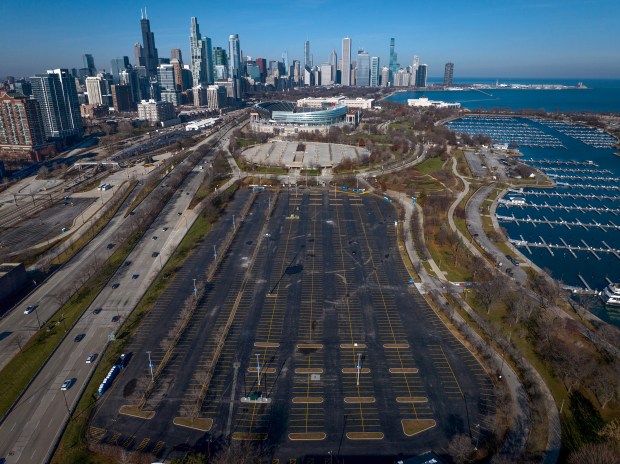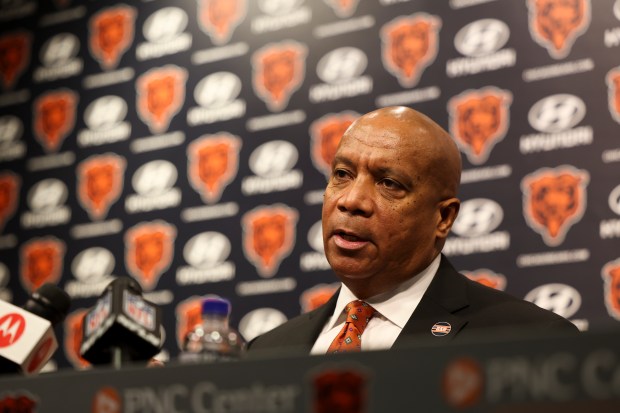ORLANDO, Fla. — Chicago Bears President and CEO Kevin Warren is billing the potential construction of a closed-roof stadium along Chicago’s lakefront as the chance for the city to have “a crown jewel that will create jobs, opportunities and mega events.”
After months of negotiations about building a stadium on the team’s $197 million Arlington Heights property and the exploration of more than 10 other sites, Warren said this week at the NFL owners meetings that a site just south of the team’s current home at Soldier Field is the “ideal location” for a new stadium.
The Bears announced their plans to contribute $2 billion to a publicly owned stadium at the museum campus site earlier this month and are making progress on building a more formal presentation, though the timing of that is still to be determined.
Details on the cost and funding are still short, but Warren touted the improved public amenities, infrastructure upgrades and economic impact that would come with the new construction. The plan if everything comes together, he said, is to “put a shovel in the ground on the lakefront.”
“We did put serious energy — many, many meetings, many conversations, many discussions, many negotiations to get (an Arlington Heights stadium tax issue) resolved — but also during that time period, my focus was to make sure to evaluate what is the best location in the state of Illinois for the Chicago Bears’ future home,” Warren told the Tribune over lunch Sunday at the JW Marriott Orlando. “And as I started to study different areas and different sites, it became very, very clear that downtown Chicago, especially along the lakefront, was the ideal location.”
Warren said he came to that conclusion as he asked himself how people from other major international cities would view the potential setup in Chicago: a new stadium complex along Lake Michigan, near “a massive and powerful downtown with great energy, with architecture that’s renowned around the world in an environment that is the epicenter of a melting pot of different races and cultures.”
“You have a great piece of land along Lake Shore Drive, adjacent to an absolutely beautiful lake, near downtown with fantastic museums,” Warren said. “So let’s start with the bones and the structures that exist. … So now, what we’ve tried to do is to say, ‘What could we do to bring that area to life even more?’”
The Bears’ plan for a stadium over the Waldron Deck and south parking lot calls for Soldier Field to be demolished, except for its colonnades. In that spot, they envision open park space and sports fields for Chicago Public Schools students and community members to use, with parking underneath. The Bears say their plan will increase open space on the museum campus by 20%.
In the 326-acre Arlington Heights location, the Bears planned entertainment and residential complexes. They wouldn’t have as many liberties along the lakefront. Warren said he is “sensitive to keeping that area as pristine and beautiful as we possibly can.”
Such a project could include year-round public amenities such as restrooms, a restaurant or a hotel — though the latter likely wouldn’t be a dealbreaker for that location.
The Bears met last week with advocacy group Friends of the Parks, which successfully fought George Lucas’ Star Wars-themed museum on the lakefront in 2016. The team presented its vision while also listening to the group’s concerns.
The potential for the closed-roof stadium to provide a venue to host major events such as the Super Bowl and the Final Four is a big piece of the Bears’ promotion of the project.
Warren said he was “shocked and somewhat embarrassed” to read a recent Sports Business Journal article ranking the top U.S. sports business cities when it comes to hosting events. Chicago was not listed among the top 25 or the 10 cities to watch. Orlando was ranked first.
“We in Chicago and the Chicagoland area and in the state of Illinois, we need to decide who we want to be,” Warren said. “Are we a preeminent, thoughtful, creative, visionary city who can do business together with each other, who can be progressive in our construction efforts, who can host the Final Four, who can host the Super Bowl, who can host certain concerts and mega events?
“I think our stadium provides the city of Chicago with the opportunity to decide who we want to be. And if we want to be that world-class city that I know that we are, this is an opportunity for us to come together and be able to do it.”
Warren wouldn’t give figures for what a stadium and the infrastructure upgrades would cost publicly, saying there will be more clarity on that in the “near future.”
The Illinois Sports Facilities Authority, a government entity created to help construct and renovate stadiums, funded the 2003 renovation of Soldier Field by issuing municipal bonds backed by a 2% hotel tax. The Bears could look to ISFA funding as one source to fill the gap between the private investment and the stadium cost.
Warren said the Bears are having continuing “productive conversations” about seeking joint public funding with the White Sox, who are exploring the potential for a new South Loop stadium. Warren said he is “energized and excited” about the Sox project.
“One thing I can guarantee you: I am fiscally conservative and I am financially responsible,” Warren said. “So anything we recommend from a financial standpoint will be very well thought-out.”
The Bears also are sorting through details about how costs and revenues would be shared in such a private-public partnership. Warren said typically ticket sales, private seat licenses, naming rights and other sponsorships would go to the team, while other revenue streams would need to be worked out.
He stressed that he hopes the public looks at the situation as a positive, and that “the Chicago Bears owned by the McCaskey family has agreed to put in $2 billion of a private investment into a project that will be owned by the public.”

“As I come to the table, I look at it as this is an opportunity for us to have a win-win-win, situation, especially for us now to be focused and energized about being downtown,” he said.
“Because you look at the alternatives that if we weren’t in Chicago, what happens to the city and the revenue? So this is a unique chance for us to come together, to be creative, to be fair with one another, and to work together and look at this as one of those situations that one plus one equals 100.”
Crain’s Chicago Business reported this week that along with stadium financing, the project could include more than $1 billion in infrastructure costs.
Warren said he believes some of the infrastructure improvement that will be needed for such a project “has needed to be done for 10 years.” The improvements likely would include improved access to the museum campus.
“Just talk to anyone who lives in Chicago and tries to commute in and around downtown,” he said. “This is not necessarily caused by the Chicago Bears on game days. The traffic is hectic on game day. But this exists Monday through Friday.”
Warren said the team is still exploring parking options and transportation upgrades.
The Bears haven’t committed to a timeline for making a final decision, but they hope to lay out a plan with renderings, video and financial details soon. Warren said his biggest concern is a potential escalation in costs, noting the Bears received information that the cost could go up as much as $200 million for every year they wait to finalize a stadium.
“These are real dollars,” Warren said. “That’s one of the reasons why I am focused on having a plan, being diligent, us working together. The time is now to really pull together.”
Warren’s heavy promotion of the lakefront stadium comes after months of property-tax disputes on the Arlington Heights project.
At the end of February, Arlington Heights village officials proposed a property tax compromise between the Bears and local school districts. The proposal suggested the Bears pay $6.3 million in taxes in 2023 and $3.6 million in 2024. That comes from the property being assessed at the 25% commercial rate for half of 2023 and the 10% vacant property rate for the other half of 2023 and for all of 2024.
The Bears and the school districts would then enter into good-faith negotiations for annual increases, which would fall between 3-10%.
Warren said he appreciated the communication from the village. But he pointed to the ongoing dispute as an example of how not having “willing parties” can make a challenging project even more difficult.
“I’m a very pragmatic and practical individual,” he said. “And if we have difficulty trying to negotiate what the tax amount is, knowing how difficult the entire project is, I had to take a step back and say, ‘If we can’t even figure out what the taxes are, we’re going to have a very difficult time coming together and working on (a memorandum of understanding) or PILOT legislation or any kind of legislation to make this work, and then the construction.’
“And so I thought it was important for us to still be respectful of each other, take a little break from each other. And for us to make it very clear that we’re focused on Chicago now. But again, I have great respect for the leaders in Arlington Heights. We still are, I believe, the largest land owner in Arlington Heights. And I’ll continually remain in communication with them. But our focus now is on Chicago.”



